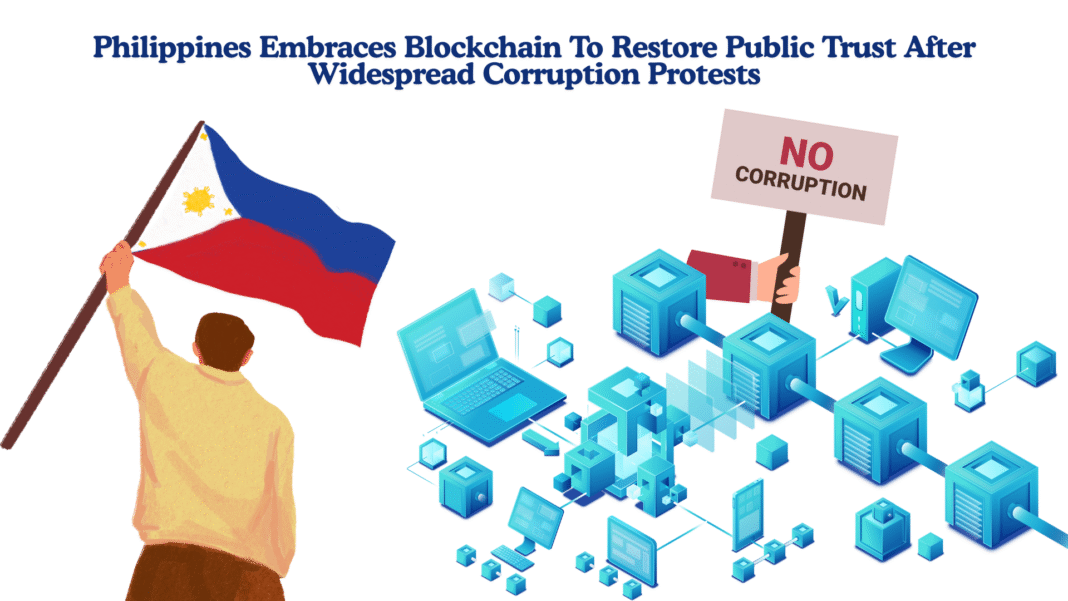The government of the Philippines has introduced a blockchain transparency system to regain public confidence after mass protests against alleged corruption in $10 billion flood-control projects.
The system is called the Integrity Chain and is developed by BayaniChain Ventures. The new platform was launched on Wednesday for the Department of Public Works and Highways (DPWH).
The system stores contracts and milestones on an unalterable, tamper-proof log, and it is intended to prevent the alteration or manipulation of government records, according to reports.
Paul Soliman, the co-founder and CEO of BayaniChain, explained that the project will transform public records into “digital public assets” that would be publicly verifiable and open to citizens’ validation.
Aiming for Systemic Accountability Across the Public Sector
Soliman highlighted that the plan is not just another technological upgrade. It is part of a greater effort to “reshape accountability across every department and every peso spent.”
He added that the blockchain ensures accountability is “permanent, measurable, and unavoidable,” allowing citizens to independently verify outcomes of their government instead of relying on government reports.
If expanded beyond the DPWH, Integrity Chain could provide protection for the entire $98 billion annual budget of the Philippines, creating “what this historic moment represents,” according to advocates of the initiative.
Also Read: Philippine SEC Warns Public On 10 Unregistered Crypto Platforms, Including OKX, Kraken & Bybit
Protests and Historical Context Fuel Urgency
The announcement takes place at a time of political fervor after protests erupted across the country on September 21, with an estimated 130,000 people demanding accountability.
Researchers have also designated this date as the 53rd year since martial law was declared by former President Ferdinand Marcos Sr., a period that is framed by abuse of human rights and systemic corruption.
Protestors accused the DPWH of favoring contracts without justifications or excessive prices, with inadequate infrastructure, and of possibly ghost projects in its flood-control programs.
Reports have indicated that more than $33 billion has been spent over 15 years on flood-control projects, and there are real concerns as to whether public funds have been squandered.
The blockchain project was advanced as a potential solution for many calls for transparency and reform.
Also Read: Philippines SEC Set to Bring In New Rules To Regulate Crypto-Asset Service Providers
How the Integrity Chain System Works?
Integrity Chain obtains data on contracts and milestones directly from the systems of the Department of Public Works and Highways (DPWH), thereby minting every contract, milestone, and budget release as digital assets.
Its orchestration layer is referred to as Prismo, which manages encryption, data validation, and coordination and publishes the data to a Proof-of-State network called Polygon.
Each record is cryptographically time-stamped and recorded on-chain; any attempt to delete or alter information is observable on the blockchain.
Civic organizations, universities, NGOs, and the media function as validators to review and attest to the information recorded.
Validators are also recorded on-chain, establishing a two-layer accountability framework that exposes both the government and validators to public accountability.
Also Read: YouTuber ‘mrwn’ Exposes Philippines Call Centre Crypto Scam Raking In $800K Annually
Crypto Developments in the Philippines
The project, called the Integrity Chain, is evidence of the Philippines’ increasing readiness to engage with blockchain technology and digital assets.
In June, the country rolled out a dual-regulator framework for crypto token listings supervised by the Bangko Sentral ng Pilipinas (BSP) and the Securities and Exchange Commission (SEC) to increase regulatory clarity and investor protection, according to UnoCrypto.
Notably, in August, we reported that lawmakers in the Philippines introduced House Bill 421, which would create a strategic reserve of Bitcoin (BTC) by purchasing an amount of 2,000 BTC annually for the next five years.
Putting together these initiatives shows that the Philippines is trying to use transparency technologies to enhance its anti-corruption agenda and position itself as an innovative player in the digital economy.


